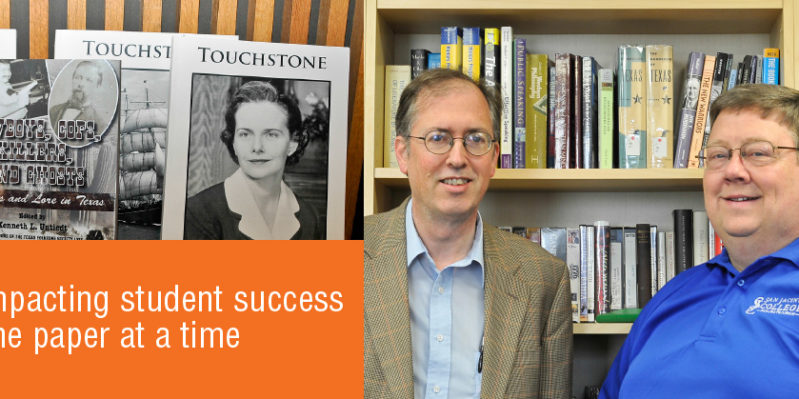
A history professor who loves to write and an English professor who loves history – it may not sound like your typical dynamic duo, but since 1998, Dr. Eddie Weller and Dr. Greg Smith have empowered students in their Honors interdisciplinary course beyond what even they imagined.
The course began after Dr. Weller put a proposal together that blended writing and literature with the history of the time periods these classic pieces were being produced – and the course was born.
“When he’s doing the Gilded Age, I’m teaching The Jungle by Upton Sinclair; when he’s teaching the 1920s, I’ll be teaching The Great Gatsby; when he gets into the Vietnam War, I’ll be doing The Things They Carried by Tim O’Brien,” said Dr. Smith, San Jacinto College English professor.
The course’s writing aspect is the shared factor, and the one that sets it apart from other English and history courses. Students in the interdisciplinary course are given a research paper assignment on Texas history or folklore that incorporates a personal interview as one of the paper’s sources. What comes out is graduate-level work, and many of their students have been invited to present their papers at statewide and national conferences as well as published in literary publications – an honor that very few undergraduates attain.
“Most of our students are freshmen,” said Dr. Weller, San Jacinto College history professor and Honors program director. “Some are entering as dual credit students still in high school, home school, right out of area high schools, or are older students entering college for the first time. Very few, if any other community college students, get opportunities to present at these conferences. Presenters are usually graduate students and professors.”
This year, Dr. Weller and Dr. Smith had three students present at the East Texas Historical Association, two present at the Great Plains Honors Conference, one at National Conference on Undergraduate Research, and two at Texas Folklore Society. A few of their students were published in this year’s Texas Folklore Society book, Cowboys, Cops, Killers, and Ghosts: Legends and Lore in Texas. Many of their students have also been published in Touchstone, the annual journal by the Walter Prescott Webb Historical Society and the Texas State Historical Association.
Getting a paper published as an undergraduate is undoubtedly an honor on its own, but it also helps with university applications. And if the student continues on to graduate school, they are already familiar with the process when it comes to writing their thesis or dissertation.
“A lot of our students tell us that they think getting to present their papers or having their papers published helped them get more scholarship money or helped them get into the universities and graduate programs they applied for,” said Dr. Smith.
“Our students are never English or history majors,” said Dr. Weller. “Today they are in all sorts of other areas – attorneys, doctors, nurses, accountants, teachers, engineers, and military officers, among others.”
Even though the course is part of the San Jacinto College Honors program, there are 12 seats reserved for Honors students and six seats reserved for students not in the Honors program. According to Dr. Weller and Dr. Smith, by the end of the semester, almost all of the non-Honors students have joined the program. The program’s smaller class sizes give students a better chance to interact more and professors an opportunity to get to know the students individually.
This is part of what makes their team teaching work so well. Both Dr. Weller and Dr. Smith thrive on student success. At the end of the day, both professors take the extra time to check in with their students to ensure that they are on their way to accomplishing the goals they have set. “One of the first things I told the interviewing committee here at the College is that I revel in student success,” said Dr. Smith. “Dr. Weller is such a great team teaching partner, and it’s because of this course, our collaboration, and the success we’ve seen in our students that I’m still here.”
For most students, it’s an initiation into the higher-level thinking and work most university courses requires. This course was created for them to make mistakes, so that they can learn from them and be better prepared to take on those harder assignments. The principles and critical thinking processes they get from this course can be applied not only to their academic work, but in their everyday lives and future careers as well.
“They feel prepared for anything,” said Dr. Weller. “It’s not easy, but it’s not impossible either. We push them because we see their potential, and once they see what they’re capable of, they start to build on that, and it’s amazing where they go from there. San Jacinto College changes people’s lives.”
The professors also become the students many times. “These students are teaching me as much as I’m teaching them,” said Dr. Smith. “They’re teaching me about their culture, history, and their background when they’re doing these papers, so I’m always learning new things myself.”
Student success is a combination of many things, but probably one of the most important things is simply the drive. The drive to set the bar high and then try to go beyond that; the drive to not give up when things seem unattainable; the drive to accept a stumble then apply what you learned from it.
“They have to have that desire,” said Dr. Weller. “It’s easy to work with students who may not have the preparation for a course like this, because we can work on that with them. But a student who has no ambition – that’s hard. Sometimes when they’re around kids with that drive, it rubs off on them. You don’t ever write anyone off. You don’t give up – you get better.”
Andrea Vasquez

